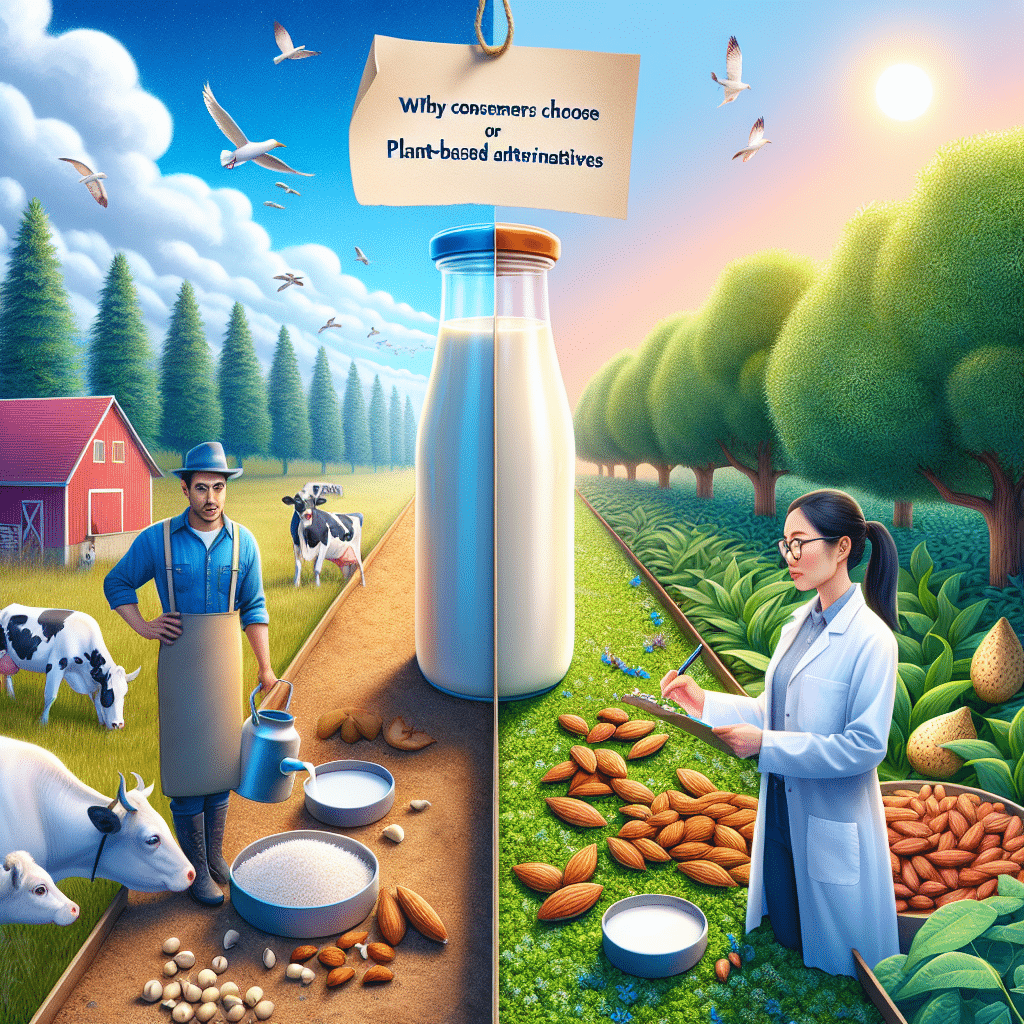Study Explores Why Consumers Choose Dairy Milk or Plant-based Alternatives
-
Table of Contents
- Dairy Milk vs. Plant-Based Alternatives: Understanding Consumer Choices
- Health Considerations Influencing Consumer Decisions
- Environmental Impact and Sustainability
- Ethical Concerns and Animal Welfare
- Taste Preferences and Culinary Uses
- Case Studies and Statistics
- Conclusion: Key Takeaways on Consumer Choices
- Discover ETprotein’s High-Quality Protein Products
Dairy Milk vs. Plant-Based Alternatives: Understanding Consumer Choices

In recent years, the debate between dairy milk and plant-based alternatives has become a significant topic of discussion among consumers, nutritionists, and environmentalists. With a growing number of options on supermarket shelves, consumers are increasingly faced with the decision of whether to stick with traditional dairy milk or opt for plant-based alternatives. This article delves into the reasons behind consumer choices, exploring health considerations, environmental impact, ethical concerns, and taste preferences.
Health Considerations Influencing Consumer Decisions
One of the primary factors driving consumer choice is health. Dairy milk has long been touted for its nutritional benefits, including being a good source of calcium, vitamin D, and protein. However, some consumers are lactose intolerant or have milk allergies, which makes dairy milk a non-viable option for them. Plant-based milks, such as almond, soy, oat, and rice milk, offer alternatives that can be easier to digest for those with lactose intolerance or milk allergies.
- Nutritional Content: Plant-based milks often have different nutritional profiles compared to dairy milk. For example, soy milk is rich in protein, while almond milk is lower in calories but not as protein-rich.
- Added Nutrients: Many plant-based milks are fortified with vitamins and minerals to match the nutritional value of dairy milk.
- Dietary Preferences: Veganism and other dietary preferences also play a role in swaying consumers towards plant-based options.
Environmental Impact and Sustainability
The environmental impact of dairy farming versus plant-based milk production is another significant factor influencing consumer choices. Dairy farming requires large amounts of water, land, and contributes to greenhouse gas emissions. In contrast, plant-based milks generally have a lower environmental footprint.
- Water Usage: Almond milk production, for example, is often criticized for its high water usage, but it still uses less water than dairy farming.
- Carbon Footprint: Plant-based milks typically generate fewer greenhouse gases than dairy milk.
- Land Use: The land required to produce plant-based milks is usually less than that needed for dairy farming.
Ethical Concerns and Animal Welfare
Animal welfare is a concern for many consumers who choose plant-based milk alternatives. The dairy industry has been criticized for practices that some consider to be inhumane, such as the separation of calves from their mothers. Plant-based milks offer a cruelty-free alternative that appeals to consumers who prioritize animal welfare.
Taste Preferences and Culinary Uses
Taste is a subjective but crucial factor in the choice between dairy milk and plant-based alternatives. Some consumers prefer the taste of dairy milk and find it irreplaceable in their diets, while others enjoy the variety of flavors offered by plant-based milks. Additionally, certain plant-based milks may be more suitable for specific culinary uses, such as coconut milk in curries or almond milk in smoothies.
Case Studies and Statistics
Recent studies and market research shed light on consumer behavior regarding milk consumption. For instance, a survey by the Plant Based Foods Association showed a significant increase in plant-based milk sales, indicating a shift in consumer preferences. Additionally, a study published in the Journal of Dairy Science explored the reasons for consumers’ switch to plant-based milks, citing health concerns, lactose intolerance, and taste as top factors.
Conclusion: Key Takeaways on Consumer Choices
In conclusion, the choice between dairy milk and plant-based alternatives is influenced by a complex interplay of health considerations, environmental impact, ethical concerns, and taste preferences. Consumers are increasingly aware of the implications of their dietary choices, leading to a rise in the popularity of plant-based milks. As the market continues to evolve, it is likely that both dairy and plant-based milks will continue to coexist, catering to the diverse needs and values of consumers worldwide.
Discover ETprotein’s High-Quality Protein Products
For those interested in incorporating high-quality plant-based proteins into their diet, ETprotein offers a range of organic bulk vegan proteins that cater to various needs. Whether you’re looking for rice protein, pea protein, or other plant-based options, ETprotein provides products with a neutral taste, non-GMO, and allergen-free attributes. Their L-(+)-Ergothioneine (EGT) products come in various grades suitable for nutraceutical, pharmaceutical, cosmeceutical, and food and beverage industries. To explore ETprotein’s offerings and enhance your health and wellness regimen, contact them at sales(at)ETprotein.com.
About ETprotein:
ETprotein, a reputable protein and L-(+)-Ergothioneine (EGT) Chinese factory manufacturer and supplier, is renowned for producing, stocking, exporting, and delivering the highest quality organic bulk vegan proteins and L-(+)-Ergothioneine. They include Organic rice protein, clear rice protein, pea protein, clear pea protein, watermelon seed protein, pumpkin seed protein, sunflower seed protein, mung bean protein, peanut protein, and L-(+)-Ergothioneine EGT Pharmaceutical grade, L-(+)-Ergothioneine EGT food grade, L-(+)-Ergothioneine EGT cosmetic grade, L-(+)-Ergothioneine EGT reference grade and L-(+)-Ergothioneine EGT standard. Their offerings, characterized by a neutral taste, non-GMO, allergen-free attributes, with L-(+)-Ergothioneine purity over 98%, 99%, cater to a diverse range of industries. They serve nutraceutical, pharmaceutical, cosmeceutical, veterinary, as well as food and beverage finished product distributors, traders, and manufacturers across Europe, USA, Canada, Australia, Thailand, Japan, Korea, Brazil, and Chile, among others.
ETprotein specialization includes exporting and delivering tailor-made protein powder and finished nutritional supplements. Their extensive product range covers sectors like Food and Beverage, Sports Nutrition, Weight Management, Dietary Supplements, Health and Wellness Products, and Infant Formula, ensuring comprehensive solutions to meet all your protein needs.
As a trusted company by leading global food and beverage brands and Fortune 500 companies, ETprotein reinforces China’s reputation in the global arena. For more information or to sample their products, please contact them and email sales(at)ETprotein.com today.












